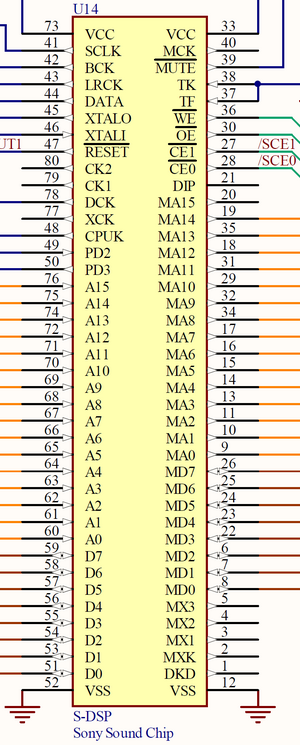We've just updated MediaWiki and its underlying software. If anything doesn't look or work quite right, please mention it to us. --RanAS
S-DSP: Difference between revisions
From SnesLab
(general purpose) |
(added max sound frequency) |
||
| Line 2: | Line 2: | ||
It has 128 registers (DSPRAM) that can be manipulated by the SPC, some of which serve no hard-wired purpose and can be used as general-purpose RAM. | It has 128 registers (DSPRAM) that can be manipulated by the SPC, some of which serve no hard-wired purpose and can be used as general-purpose RAM. | ||
The highest sound frequency that the S-DSP can produce is 16kHz, because of the 32kHz rate that sample-points are output. [1] | |||
[[File:s-dsp schematic.png|thumb|S-DSP in region D4 of the jwdonal schematic]] | [[File:s-dsp schematic.png|thumb|S-DSP in region D4 of the jwdonal schematic]] | ||
=== References === | |||
* [1] https://problemkaputt.de/fullsnes.htm#snesapudspbrrpitch | |||
[[Category:SNES Hardware]] | [[Category:SNES Hardware]] | ||
Revision as of 06:23, 14 June 2023
The S-DSP is the digital signal processor. It produces audio for the DAC and is controlled by the SPC700.
It has 128 registers (DSPRAM) that can be manipulated by the SPC, some of which serve no hard-wired purpose and can be used as general-purpose RAM.
The highest sound frequency that the S-DSP can produce is 16kHz, because of the 32kHz rate that sample-points are output. [1]


